Systems Thinking
The basic need for food is interconnected with other needs and ecosystem services – air, water, waste management, energy, and more. Problems in one system tend to multiply into other areas. But solutions can also be multiplied. For reasons of food safety and health, cities are increasingly engaging in food policies and urban farming.
Given that we have one interconnected planet, we cannot throw stuff away and forget it. It is still there, and can come back in our air, our water, and our food. Expanding the concept of reduce, reuse, recycle should include another ’r’ – repair, while sinks must be properly maintained as the part of our environment that can uptake some waste and pollutants.
The ability to think in interconnected systems is more crucial than ever. Systems thinking helps us to understand how different elements of a system influence each other, for example, if we increase the number of cars on urban roads will this have an effect on of issues such as traffic accidents, air pollution or even loss of working hours due to increased traffic jams?
Read this article for an introduction to systems thinking.
Cities are excellent examples of complex, adaptive, systems. This video demonstrates how system changes are impacting cities, linking cities and natural systems.
Reflection questions:
- Which elements do you think have the biggest influence on our urban environment?
- Where can you make the biggest change for the least effort?
- Try developing a connections circle to establish how different elements in your city impact each other (see here for how to make a connections circle).
Digging deeper...
This video provides a deeper dive into three inter-linked urban issues...food-water-energy.
Two helpful websites for using systems thinking in education:
